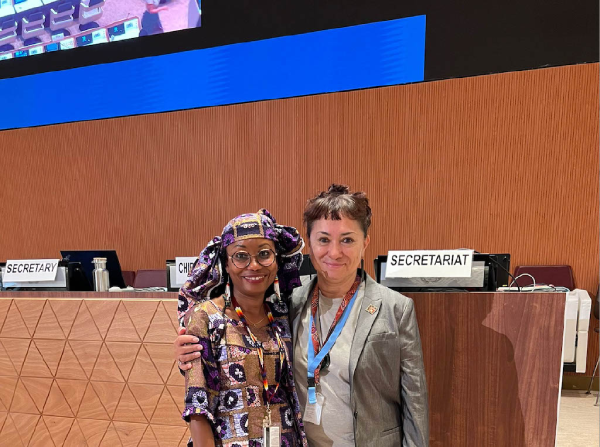Dr Valmaine Toki (Ngāti Rehua, Ngātiwai, Ngāpuhi), a distinguished Professor in Law at the University of Waikato, has been named Chair of the United Nations’ Expert Mechanism on the Rights of Indigenous Peoples (EMRIP) during its annual session in Geneva in July.

Professor Toki (right) with current UN Permanent Forum on Indigenous Issues Chair Hindou Oumarou Ibrahim.
Prior to her appointment to EMRIP Professor Toki served two terms on the UN’s Permanent Forum on Indigenous Issues between 2011 and 2016. She was appointed to the Expert Mechanism in 2022 on which she advocates for the global progress and recognition of Indigenous rights and is the first Māori and New Zealander to have held these prestigious positions and titles.
Reflecting on the last two years in her role, Professor Toki says the mandate of the Expert Mechanism is to interpret, clarify and provide advice on the implementation of the UN Declaration on the Rights of Indigenous Peoples.
“It is humbling to be appointed as Chair,” says Professor Toki.
Professor Toki is one of seven EMRIP members who meet annually at the UN in Geneva to understand the challenges Indigenous people face, particularly in the context of the fundamental rights articulated in the UN Declaration on the Rights of Indigenous Peoples. EMRIP is a subsidiary body of the UN Human Rights Council.
“It’s important that we continue to progress our important mandate to assist Member States to achieve the goals and meaningfully realise the fundamental rights articulated in the UN Declaration on the Rights of Indigenous Peoples.”
She credits the many Indigenous advocates before her, including New Zealand lawyer Dr Moana Jackson and Rātana founder, Tahupōtiki Wiremu Ratana.
“Moana Jackson and Tahupōtiki Wiremu Ratana are well-respected rangatira and inspirational trailblazers who have advocated, undaunted, to achieve the recognition of the fundamental rights for Indigenous Peoples not only on a state level but also on the international stage.”
In her address at the 17th session of the UN Expert Mechanism in early July, Professor Toki said it was a great honour to take the floor as the new Chair of the EMRIP.
"I would like to recall that the United Nations promotes dialogue and exchanges between different actors with a view to promoting sustainable peace, development and human rights,” she told fellow attendees.
Professor Toki outlined upcoming discussions, including Indigenous Peoples' rights in post-conflict situations, peace processes, enhancing participation in the UN and the International Decade of Indigenous Languages.
In October last year, the Expert Mechanism resumed its country engagement missions, she said.
The first one was to Australia providing advice on the contemporary removal of Aboriginal and Torres Strait Islander children from their families and communities. A second mission was conducted in Norway in March this year, focusing on the rights of the Saami people.
Professor Toki says Indigenous Peoples figure prominently across all social indicators and face a myriad of challenges.
“These range from bearing the brunt of the adverse effects of climate change, to breaches of their rights to free, prior, and informed consent – particularly regarding extractive industries – and their current advocacy for enhanced participation during the UN Human Rights Council processes,” she says.
Professor Toki holds a Bachelor of Arts, Bachelor of Laws with Honours and Master of Laws from the University of Auckland, a Master of Business Administration from the University of Tasmania, and a PhD in Law from the University of Waikato.
She spent five years lecturing at the Auckland Law school before joining Te Piringa Faculty of Law at Waikato University in 2012.
Her research, writing and teaching focus on Indigenous rights, on which she has also given public lectures and seminars globally including at Harvard Law School. She holds a practicing certificate as a Barrister and Solicitor of the High Court and her new book is titled Indigenous Rights, Space, Climate Change, Governance, Measuring Success, and Data.



